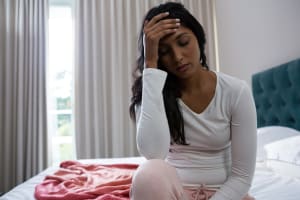Depression is one of the most commonly diagnosed mental health conditions in the U.S. In 2017, the National Institute of Health reported that over 7% of all Americans over the age of 18 had at least one major depressive episode.

Your mind and sleep are deeply intertwined. Experts say one of the most common symptoms of clinical depression is trouble during the night. Those diagnosed with it are likely to suffer from insomnia and trouble staying asleep throughout the night. Patients are likely to have problems with oversleeping. All of these symptoms negatively affect other aspects of wellness and intensify symptoms of depression.
It is therefore very important to understand the relationship between this disorder and sleep from both a diagnostic perspective as well as a treatment.
What depression looks like
Depression is a mental health mood disorder that comes in many varieties and severities. Common types of it include postpartum depression (PPD), seasonal affective disorder (SAD), Persistent depressive disorder (Dysthymia), Psychosis, bipolar disorder and more. Changes to mood and behavior are characteristic of all forms of the disorder.
According to the NIH, some of the most common psychological symptoms of depression are:
- Prolonged feelings of sadness, anxiety, or emptiness
- Extreme pessimism or hopelessness
- Feeling guilt, worthlessness, and helplessness
- Loss of interest in hobbies and previously pleasurable activities
- Problems with memory, decision making, and concentration
- Suicidal thoughts
Depression also inflicts significant physical changes to the body, including:
- Loss of energy, and a continual feeling of fatigue
- Sluggishness in movement and speech
- Various aches, pains, and cramps with no apparent causes
- Restlessness and trouble staying still
- Changes in appetite and weight
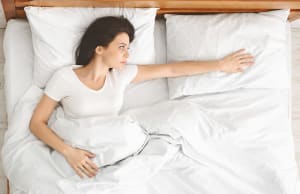 As mentioned above, trouble sleeping is another important sign of depression that doctors use as a diagnostic tool. For a patient to receive a formal diagnosis of clinical depression, they must experience a combination of these symptoms for no less than two weeks.
As mentioned above, trouble sleeping is another important sign of depression that doctors use as a diagnostic tool. For a patient to receive a formal diagnosis of clinical depression, they must experience a combination of these symptoms for no less than two weeks.
The roots of depression
Depression is an extremely complex mental illness which occurs under certain conditions of genetics and environmental interaction. As noted by Harvard Health Publishing, the often-used description of depression as simply a “chemical imbalance” is no longer accepted in the medical community. Instead, experts believe that a list of factors affect whether, and how, any individual person might feel the disorder. Genetics play a role in this, but so do personality traits, stress, traumatic life events, and medications.
Scientists are starting to paint a picture of depression at the neurological level, however, noting that it is associated with problems in certain parts of the brain, including the thalamus, amygdala, and hippocampus. There appears to be an imbalance of neurotransmitters (specifically serotonin) in diagnosed patients, as well as misfirings in the fight-or-flight response system responsible for certain hormone production.
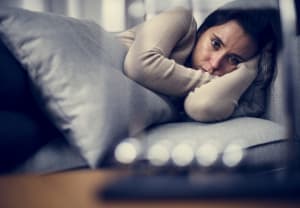
Depression often runs in families; having any family member with this type of mental health disorder increases the chance that someone else may develop it. Genetics are also a risk factor in setting the sensitivities patients have to stress and trauma, which can cause short- or long-term depression in many people.
Depression changes sleeping patterns, and poor sleep exacerbates symptoms
Problems sleeping are extremely common in patients with depression. A 2008 literature review of scientific studies on sleep and depression concluded the following:
- Insomnia is very common among patients and is often the main reason they seek treatment for their illness
- Sleep architecture is altered in patients and antidepressants can reverse that alteration
- Sleep disturbances in patients can be used to predict the effectiveness of different treatments
- Sleep manipulation affects mood
These shifts in your nighttime patterns, especially when prolonged for more than two weeks, can be an important symptom. More specific descriptions of the sleep disruptions include:
- Insomnia: Insomnia is the most common sleep disorder associated with depression, affecting up to three-quarters of all diagnosed patients. This includes extreme difficulty in getting to sleep, maintaining sleep throughout the night and the problem of waking up too early in the morning. Some patients find that negative thoughts keep them up at night, and fear of not being able to get adequate sleep can lead to sleep anxiety.
- Hypersomnia: This term refers to sleeping too much, and it affects about 40% of younger depressed patients and about 10% of older patients.
- Abnormal Sleep Architecture: Studies have shown that patients typically have less sleep latency in the REM stage of the sleep cycle, get less slow-wave sleep, and have periods of abnormal awakening than a non-depressed patient.
- Obstructive Sleep Apnea (OSA): Evidence suggests a link between depression and OSA, with over 50% of OSA patients claiming a dual diagnosis for both.
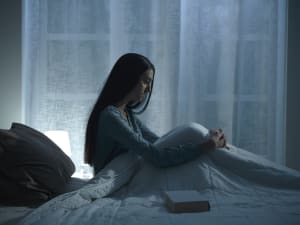 All of these changes to nighttime patterns decrease the quality and amount that depressed patients receive. This adds to an increase in the severity of other symptoms of depression, especially mood changes, fatigue, and problems with focus and memory. The result is a dangerous cycle where the lack of sleep causes more intense depression that, itself, may lead to your nighttime routine becoming less healthy.
All of these changes to nighttime patterns decrease the quality and amount that depressed patients receive. This adds to an increase in the severity of other symptoms of depression, especially mood changes, fatigue, and problems with focus and memory. The result is a dangerous cycle where the lack of sleep causes more intense depression that, itself, may lead to your nighttime routine becoming less healthy.
Treatment for sleep disorders linked to mental health
Mending control of healthy sleeping patterns is an important step in treating depression. Experts recommend the following steps to help those patients with depression, sleep better:
- Talk with your doctor about medication: There are a number of medications that have shown promise in treating sleep problems for patients. Many of them work by addressing the other symptoms of depression that make sleep difficult. SSRIs, antidepressants, sleep medications, and other hypnotics might be recommended by your doctor, depending on the severity of your symptoms and medical history.
- Do not seek medication without speaking to your doctor about the entirety of your depression symptoms. They will often recommend medications in tandem with some sort of therapy.
- Maintain a healthy diet and exercise routine: Keeping your body healthy by eating well and getting enough exercise will increase your chances of getting through the night better. Learn how your immune system can affect your sleep. Make sure to not eat too much, exercise, or drink caffeine too close to your bedtime, as these things can stimulate you and make nighttime rest more difficult.
- Establish relaxing bedtime routines: If you find that negative thoughts are keeping you up at night, try finding ways to clear your head by meditating, listening to music, or otherwise calming yourself as you prepare to sleep.
- Dedicate your sleep space to sleeping: Make sure your bed is used only for sex and sleep. Keep your room cool, dark and quiet. Above all else, do not use electronics in bed, and if you have trouble falling asleep, get up and do something until you are tired rather than tossing and turning.
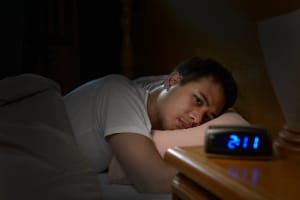

 To address the main sleep problems associated with anxiety, try the following tips and tricks to manage symptoms during bedtime:
To address the main sleep problems associated with anxiety, try the following tips and tricks to manage symptoms during bedtime:
